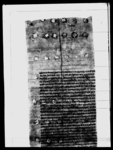A letter from Jīvanātha Śarmā to Prime Minister Jaṅga Bahādura Rāṇā re the erection of a śivaliṅga by women (VS 1920)
ID: DNA_0004_0018
Edited and
translated by Axel Michaels
in collaboration with
Manik Bajracharya and Rajan Khatiwoda
Created: 2015-02-18;
Last modified: 2018-06-18
For the metadata of the document, click here
The accompanying edition, translation/synopsis and/or commentary are available under the terms of the Creative Commons Attribution-ShareAlike 4.0 International License
Abstract
This letter sent by Jīvanātha Śarmā from Benares to Prime Minister Jaṅga Bahādura Rāṇā reports about a dispute among paṇḍitas of a dharmasabhā over whether women should be allowed to erect a śivaliṅga by touching it.Diplomatic edition
[1r-part1]
⟪1नं३५७⟫1शिवलिङ्ग2१1स्वस्तिश्रीमदतिप्रचण्डभुजदण्डेत्यादिश्रीश्रीश्रीमहाराजजङ्गवहादुरराणाजीसी•वी
2थोङ्•लिन्•पिम्•माको•काङ्वाङ्स्यान्प्राइम्मिनिष्टरयाण्डकम्याण्डरइन
3चिफ्देवेषु•सदासमरविजयिषु•जीवनाथशर्मणःशुभाशीर्वादपूर्वकंप्रत्रमि
4दम्•हजूरकापुण्यप्रतापले•ञाहाकुशलआनन्दछ•ताहाहजूरमा•सदासर्वदा
5कुशलआनन्दरह्या•मेरो•प्रतिपालनहोला•आगेञाहाकोसमाचारभलोछ•उ
6प्रान्त•आश्विनसुदि५रोज४कादिनलेषिवक्सनुभयाकोमेहरवान्गीकोरुक्का
7कार्त्तिकवदि२रोज२कादिनआइपुग्यो•अर्थविस्तारमालुमभयो¯ ¯१¯स्थापन
8कागडवडलेमेरामनमासाह्रैसन्तापभैरहेछ•योसन्तापछुट्तछकि•छुट्तै
9नभन्याहुकुमआयाकोरहेछ•पण्डितहरूआफ्नामुखलेकैल्हेपनिकायलहुँदैन
10न्•झगडागर्दैरहन्छन्•कुराछिनिदैनन्•भनिमध्यस्थराषनुपर्दछ•सो•एस
11कुरामा•हजूरवाटपारवालाराजालाईर•उन्काधर्मसभालाईमध्यस्थराषि
12निर्णयहुदा•मध्यस्थहरूलेजोकुरोठहराया•त्योकुरो•दुवैतरफकापण्डितलेमा
13न्नुपर्छ•मान्दैनौँभन्नहुदैन•धेरैग्रन्थका•धेरैनिषेधवचनकाअर्थर•तीजतिनि
14षेधकावचन्छन्•सवैनिषेधकासामान्यवचन्छन्•पतिकोआज्ञानभयाका•सं
15स्कारनभयाका•दीक्षानभयाका•यस्ता•स्त्रीलाईयीवचन्लेनिषेधगर्याकोहोभनि
16सवैवचन्कोएकवाक्यताहुन्छ•पतिकाआज्ञालेस्थापनागर्नहुन्छभन्यायस्ताधे
17रैविधिकावचन्जोछन्•तिविधिवचन्लेकस्तास्त्रीलाईस्थापनगर्नहुन्छभनि
18विधानगर्याकोहो•त्यस्कोपनिएउटाअर्थलगाउनुपर्दछभनिधर्मसभाका
19पण्डितहरूलेभन्दा•राजारामशास्त्री•वालशास्त्रीहरूवाटकेहिअर्थलागिसक्ये
20न•उठिकनआफ्नाघर२मागया•अर्कादिनएकपद्धतिकोपुस्तकलिइकनगया
21काथिया•उस्मायजमानले•आफ्नाहातले•केहिकामपनिनगर्नु•जोगर्नुछसवैआ
22चार्यद्वारागराउनुभनिलेष्याकोरहेछ•त्योपद्धति•सभामाप्रमाणठहरेन•उस्दिन
23उत्तिकैभयो•अर्कादिनफेरिवोलाइपठाउँदाराजारामशास्त्री•वालशास्त्रीहरूसभामा
[1r-part2]
24आयानन्•महाजन्हरिचन्वावुकाहातहामीहरूआउँदैनौँ•तिमिहरूकोव्यवस्थाप
25त्रखण्डनगराउनुछभन्या•व्यवस्थापत्रहाम्राघरमापठाइदेउखण्डनगरिपठाइ
26दिउँलाभनिपठाया•सभामावस्याकापण्डितहरूलेपनि•तिनीहरूकोहुदैनभन्याव्यव
27स्थापत्रपठाइदिउन्•हामिखण्डनगरिपठाइदिउँलाभनिजवावदिया•एस्उस्ले•
28यस्तोपक्षगर्न्यापण्डितहरूकासम्मतिकोक्याप्रमाणछ•तिनीहरूलेसम्मतिगर्नुपर्दैन•ति
29नीहरूकासम्मतिकोमलाइअपेक्षाछैन•व्यवस्थापत्रतयारगरभनि•तयारगराइपार
30वालाराजालेचह्राइपठायाकोव्यवस्थापत्र•हजूरमादाषिलभयोहो•उस्लेसवहालजाहे
31रहोला•अवएतिभयापछि•कसैकापैसा•कौडिकोअपेक्षानराषन्यापारवालाराजाले•आ
32फ्नाधर्मसभामा•सवपण्डितवटोली•निर्णयगर्दा•पण्डितहरूले•जौन्कुरामासम्मतिग
33र्या•त्योकुरोप्रमाणहुन्छ•रूपैयाषाइकनसम्मतिगर्याको•मन्पर्याकामानिसकोनाम
34लेष्याकोव्यवस्थापत्रप्रमाणहुँदैन•धेरैरूपैयादियादेषि•आजकालकापण्डितलेसकल
35कुरामासम्मतिगर्दछन्•धर्माधर्मकोविचारकेहिराषदैनन्•साना२ठाउँमात•धेरैजग्गा
36मा•इनीहरूले•दुवैतरफसम्मतिगर्याकाछन्•ठुलाठाउँमापनिरूपैयाषाइपैल्हेजयपुर
37वालाराजालाइ•रंगाचारिहरूकोरामानुजमतवेदविहितहोइनभन्न्याव्यवस्थापत्रमा•स
38म्मतिगरिदिया•पछिरंगाचारिले•धेरै•रूपैयादिदा•रामानुजकोमतवेदविहितैहो
39भनिरंगाचारिलाइपनिव्यवस्थापत्रमासम्मतिगरिदिया•इनीहरूपैसालेसम्मतिगर्न्या
40हुन्•धर्महेर्न्याहोइनन्•आजकालनदियासान्तिपुरवाटस्त्रीलाइ•¯ ¯१¯स्थापनगर्नहुदै
41नभन्न्याव्यवस्थापत्रमगाइपठायाभन्न्याकुरासुनिन्छ•इसवै•पोकाकासम्मतिभयाका
42व्यवस्थापत्रहुन्•तिनीहरूभन्दापैल्हे•मैलेपनि•कलकत्ताकोपाठसाला•भाटपारा•नदीया
43सान्तिपुर•इतीनैजग्गाकापण्डितहरूकोसम्मतिगराँउनमानिसपठायाकोथियो•त्यसै
44विचमानदियासान्तिपुरकोव्यवस्थापत्रसर्कारमादाषिलभयो•उतैवाटमगाइयोभ
45न्दासुन्या•रषर्चधेरैलागन्याहुदा•डरलेनदियासान्तिपुरकोरोकाइपठायाँ•कलकत्ता
46कापाठसालाकोरभाटपाराकोव्यवस्थापत्र•मसितछ•अरुपनित्यस्कोकामछभनिहुकु
47मभया•हजूरमाचह्राइपठाउँला•जहासम्म•पतिकोआज्ञाभयापनि•संस्कारभ
48याकाभयापनि•दीक्षासुन्याकाभयापनि•स्त्रीलाईसर्वथाअधिकारछैनभन्यायस्तास्मृति
49का•स्पष्टनिषेधभयाकावचनमिल्दैनन्•ताहासम्म•योसनातनचलिआयाका•रितिमा•
50हजूरवाटकत्तिपनिसन्देहराषिवक्सनुपर्दैनकिभन्न्याझैँ•मेराचित्तमालाग्दछ•वाहाप
51छिजान्याहजूरहोइवक्सनुहुन्छ•जोहुकुमसोसहि•वहुतकहातकविन्तीगरू•ईमेरा
52शुभचिन्तकहुन्भनिमेराउपर•मेहरवान्गीकोनजरराषिवक्सनुभया•मेरो•दुष्ष
53दारिद्र्यदूरहोला•विज्ञेषु•प्रतिपालकेषु•किमधिकमितिसम्वत्१९२०सालमिति•
54कार्त्तिकवदि१२रोज६मुकामवनारसरामघाटपटनीमलकाहवेली•शु
55भ¯¯¯¯ ¯¯¯¯ ¯¯¯¯ ¯¯¯¯ ¯¯¯¯¯¯¯¯ ¯¯¯¯ ¯¯¯¯
Translation
[1r-part1]
No. 357
Śivaliṅga 1
Hail. This is a letter [written] with the good blessings of Jīvanātha Śarmā to triply glorious and favoured Mahārāja Sir Jaṅga Bahādura Rāṇā, who holds very formidable power in his arms etc., GCB thoṅ. lin. pim. māko. kāṅ. vāṅ. syān1 Prime Minister and Commander-in-Chief, who is always victorious in battle.
By your meritorious dignity [everything] here is fine and pleasant. I will be protected if with you there [everything] is always fine and pleasant. Āge: the tidings here are well.
Uprānta: The rukkā, which was written by you in your kindness on Wednesday, the 5th day of the bright half of Āśvina, reached [here] on Monday, the 2nd of the dark half of Kārttika. The purport of the details is understood.
The order has come from you [that begins with the words] ‘Because of the dispute over establishing -1- (a śivaliṅga), I have been grievously tormented in my mind. Will this torment disappear or not?’ From the mouth of paṇḍitas never comes an admission [of mistakes]. They keep on fighting. Since they never come to an agreement, a mediator needs to be appointed. A decision was made after you had fixed as mediators in this matter the king on the other side (pāravāla, i.e.Ramnagar on the other side of the Gaṅgā)2 and his dharmasabhā. Whatever is concluded by these mediators needs to be accepted by the paṇḍitas of both sides. One [side] must not say, ‘We don't accept [that].’ [Regarding] the meaning of words of prohibition from various scriptures, these are all general statements of prohibition [no matter] how many words of prohibition there are. [Thus] whatever prohibitory statements have been made [in the smṛti] for women who have no orders from their husband, no saṃskāra (i.e., are not married), [and] no initiation [for the daily worship], there is unanimity in all these mandatory injunctions. [However,] Rājārāma Śāstrī3 [and] Bāla Śāstrī4 could not provide a meaningful interpretation [of the scriptures] when they were asked by the paṇḍitas of the dharmasabhā to explain what kind of women are allowed to establish [a śivaliṅga], given the fact that there are so many mandatory injunctions which allow [married women] to establish [one only] by order of their husband.
They [both] stood up and went to their respective houses. The next day they returned with a ritual handbook [confirming their position]. In it was written that a yajamāna is not allowed to do any work by his own hand; whatever is to be done should be done [only] through the priest. This handbook was not accepted as probative authority in the assembly. That day passed, [and] the next day Rājārāma Śāstrī and Bāla Śāstrī did not come to the assembly (even) after an invitation had been sent to them.
[1r-part2]
They sent [a message back] through the reputable (lit. great person: mahājana) Harican Bābu, who said: ‘If you want your vyavasthāpatra5 criticized, send it to our houses. We will return it to you after criticizing it [ourselves]." The paṇḍitas sitting in the dharmasabhā replied: "Let them (the two Śāstrīs) send a vyavasthāpatra which denies permission; we will in turn criticize [their decision].’‘What proof is consensus [reached] among such biased paṇḍitas? They need not agree. I don't expect any consensus from them. Prepare the vyavasthāpatra!’ [Thus] the king from the other side ordered a vyavasthāpatra, which was dispatched to you. Through this everything will be known. From now on whenever the king on the other side − who has himself no interest in money or cowries − assembles all the paṇḍitas in his dharmasabhā and a decision is made through consensus among [those] paṇḍitas, then this is [enough] proof. [By contrast,] a vyavasthāpatra signed by persons of one's own liking who have agreed after taking bribes cannot be considered as proof. If given a lot of money, today's paṇḍitas agree on all topics. They don't think about what dharma is and [what] adharma [is]. In petty things they have reached consensus on both sides at various places. In something of very great importance, too, they once took money and reached consensus in a vyavasthāpatra to the king of Jaipur, saying that the doctrine of Rāmānuja ascetics (raṅgācāri) is not taught in the Veda. After the raṅgācāris gave [them] a lot of money, they (the paṇḍitas) also reached consensus in a vyavasthāpatra to the raṅgācāris, saying that the doctrine of Rāmānuja is taught in the Veda. They are ones who agree because of money; they do not consider the dharma.
These days it is heard that [these two paṇḍitas] asked for a vyavasthāpatra to be sent from Nadiyā Śāntipura (a university in Bengal?) − [one] stating that no woman is allowed to establish -1- (a śivaliṅga). The packages that I am sending now contain all the vyavasthāpatras in which consensus was reached. Before them, I also had sent my people to generate consensus among paṇḍitas from the following three places: Kalkattā Pāṭhaśālā, Bhāṭapārā and Nadiyā Śāntipura. Meanwhile I have heard that the vyavasthāpatra from Nadiyā Śāntipura has arrived at [the seat of your] government, and being afraid of incurring [too] many expenses, I put a stop to [my order] of [another] vyavasthāpatra from Nadiyā Śāntipura. The vyavasthāpatras given by the Kalkattā Pāṭhaśālā and Bhāṭapārā are with me. If this needs further work I will send it to you upon your orders. As long as clear of prohibition are not found in the smṛti to the effect, explicitly, that women have absolutely no right [to establish a śivaliṅga] regardless of their husband’s orders, of their being married and of their having heard the mantra [of initiation], it seems to me that you should not have any doubt regarding the customs which have always been practised. After all, you are the knowledgeable one. Your orders are [always] correct. What more can I say?
My suffering and poverty will disappear if you cast your compassionate eyes on me saying: ‘He is my well-wisher.’
Thus, on Friday the 12th day of the dark half of Kārttika, in the [Vikrama] era year 1920 (1863 CE). Residence: VārāṇasīRāmaghāṭa, Paṭanīmala Havelī. May it be auspicious.


